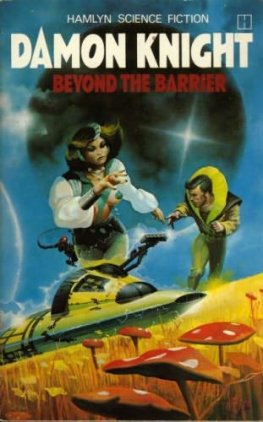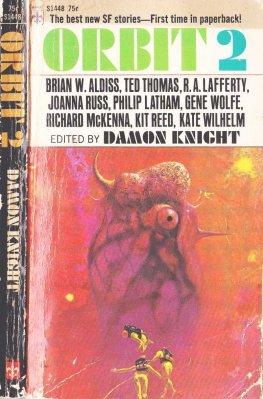Stranger Station
by Damon Knight
The clang of metal echoed hollowly down through the Stations many vaulted corridors and rooms. Paul Wesson stood listening for a moment as the rolling echoes died away. The maintenance rocket was gone, heading back to Home; they had left him alone in Stranger Station.
Stranger Station! The name itself quickened his imagination. Wesson knew that both orbital stations had been named a century ago by the then-British administration of the satellite service; Home because the larger, inner station handled the traffic of Earth and its colonies; Stranger because the outer station was designed specifically for dealings with foreignersbeings from outside the solar system. But even that could not diminish the wonder of Stranger Station, whirling out here alone in the darkwaiting for its once-in-two-decades visitor
One man, out of all Sols billions, had the task and privilege of enduring the aliens presence when it came. The two races, according to Wessons understanding of the subject, were so fundamentally different that it was painful for them to meet. Well, he had volunteered for the job, and he thought he could handle itthe rewards were big enough.
He had gone through all the tests, and against his own expectations he had been chosen. The maintenance crew had brought him up as dead weight, drugged in a survival hamper; they had kept him the same way while they did their work and then had brought him back to consciousness. Now they were gone. He was alone.
But not quite.
Welcome to Stranger Station, Sergeant Wesson, said a pleasant voice. This is your alpha network speaking. Im here to protect and serve you in every way. If theres anything you want, just ask me. It was a neutral voice, with a kind of professional friendliness in it, like that of a good schoolteacher or rec supervisor.
Wesson had been warned, but he was still shocked at the human quality of it. The alpha networks were-the last word in robot brainscomputers, safety devices, personal servants, libraries, all wrapped up in one, with something so close to personality and free will that experts were still arguing the question. They were rare and fantastically expensive; Wesson had never met one before.
Thanks, he said now, to the empty air. Uhwhat do I call you, by the way? I cant keep saying, Hey, alpha network.
One of your recent predecessors called me Aunt Nettie, was the response.
Wesson grimaced. Alpha networkAunt Nettie. He hated puns; that wouldnt do. The aunt part is all right, he said. Suppose I call you Aunt Jane. That was my mothers sister; you sound like her, a little bit.
I am honored, said the invisible mechanism politely. Can I serve you any refreshments now? Sandwiches? A drink?
Not just yet, said Wesson. I think Ill look the place over first.
He turned away. That seemed to end the conversation as far as the network was concerned. A good thing; it was all right to have it for company, speaking when spoken to, but if it got talkative
The human part of the Station was in four segments: bedroom, living room, dining room, bath. The living room was comfortably large and pleasantly furnished in greens and tans; the only mechanical note in it was the big instrument console in one corner. The other rooms, arranged in a ring around the living room, were tiny; just space enough for Wesson, a narrow encircling corridor, and the mechanisms that would serve him. The whole place was spotlessly clean, gleaming and efficient in spite of its twenty-year layoff.
This is the gravy part of the run, Wesson told himself. The month before the alien camegood food, no work, and an alpha network for conversation. Aunt Jane, Ill have a small steak now, he said to the network. Medium rare, with hashed brown potatoes, onions and mushrooms, and a glass of lager. Call me when its ready.
Right, said the voice pleasantly. Out in the dining room, the autochef began to hum and cluck self-importantly. Wesson wandered over and inspected the instrument console. Air locks were sealed and tight, said the dials; the air was cycling. The station was in orbit and rotating on its axis with a force at the perimeter, where Wesson was, of one g. The internal temperature of this part of the Station was an even 73.
The other side of the board told a different story; all the dials were dark and dead. Sector Two, occupying a volume some eighty-eight thousand tunes as great as this one, was not yet functioning.
Wesson had a vivid mental image of the Station, from photographs and diagramsa five-hundred-foot Duralumin sphere, onto which the shallow thirty-foot disk of the human section had been stuck apparently as an afterthought. The whole cavity of the sphere, very nearlyexcept for a honeycomb of supply and maintenance rooms and the all-important, recently enlarged vatswas one cramped chamber for the alien
Steaks ready! said Aunt Jane.
The steak was good, bubbling crisp outside the way he liked it, tender and pink inside. Aunt Jane, he said with his mouth full, this is pretty soft, isnt it?
The steak? asked the voice, with a family anxious note.
Wesson grinned. Never mind, he said. Listen, Aunt Jane, youve been through this routinehow many times? Were you installed with the Station, or what?
I was not installed with the Station, said Aunt Jane primly. I have assisted at three contacts.
Um. Cigarette, said Wesson, slapping his pockets. The autochef hummed for a moment, and popped a pack of G. I.s out of a vent. Wesson lighted up. All right, he said, youve been through this three times. There are a lot of things you can tell me, right?
Oh, yes, certainly. What would you like to know?
Wesson smoked, leaning back reflectively, green eyes narrowed. First, he said, read me the Pigeon reportyou know, from the Brief History. I want to see if I remember it right.
Chapter Two, said the voice promptly. First contact with a non-Solar intelligence was made by Commander Ralph C. Pigeon on July 1, 1987, during an emergency landing on Titan. The following is an excerpt from his official report:
While searching for a possible cause for our mental disturbance, we discovered what appeared to be a gigantic construction of metal on the far side of the ridge. Our distress grew stronger with the approach to this construction, which was polyhedral and approximately five times the length of the Cologne.
Some of those present expressed a wish to retire, but Lt. Acuff and myself had a strong sense of being called or summoned in some indefinable way. Although our uneasiness was not lessened, we therefore agreed to go forward and keep radio contact with the rest of the party while they returned to the ship.
We gained access to the alien construction by way of a large, irregular opening The internal temperature was minus seventy-five degrees Fahrenheit; the atmosphere appeared to consist of methane and ammonia Inside the second chamber, an alien creature was waiting for us. We felt the distress, which I have tried to describe, to a much greater degree than before, and also the sense of summoning or pleading We observed that the creature was exuding a thick yellowish fluid from certain joints or pores in its surface. Though disgusted, I managed to collect a sample of this exudate, and it was later forwarded for analysis
The second contact was made ten years later by Commodore Crawfords famous Titan Expedition
No, thats enough, said Wesson. I just wanted the Pigeon quote. He smoked, brooding. It seems kind of chopped off, doesnt it? Have you got a longer version in your memory banks anywhere?
There was a pause. No, said Aunt Jane.
There was more -to it when I was a kid, Wesson complained nervously. I read that book when I was twelve, and I remember a long description of the alienthat is, I remember its being there. He swung around. Listen, Aunt Janeyoure a sort of universal watchdog, that right? Youve got cameras and mikes all over the Station?




